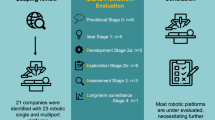Abstract
Purpose
We compared the results of prospective and retrospective cohort studies in the field of digestive surgery to clarify whether the results of prospective cohort studies were more similar to those of randomized controlled trials (RCTs).
Methods
We conducted a secondary analysis of the results to compare the results of RCTs with those of cohort studies in meta-analyses of 18 digestive surgical topics. The data from the prospective and retrospective cohort studies were combined. The summary estimates of each design were compared with those of RCTs. We used the Z score to investigate discrepancies.
Results
Twenty-nine outcomes of 11 topics were investigated in 289 cohort studies (prospective, n = 69; retrospective, n = 220). These were compared with the outcomes of 123 RCTs. In comparison to retrospective studies, the summary estimates of the prospective cohort studies were more similar to those of the RCTs [19/29 (prospective) vs. 10/29 (retrospective), P = 0.035). Five of the 29 outcomes of prospective studies and 6 of 29 outcomes of retrospective studies (P = 0.99) showed significant discrepancies in comparison to RCTs.
Conclusions
In the digestive surgical field, the results of prospective cohort studies tended to be more similar to those of RCTs than retrospective studies; however, there were no significant discrepancies between the two types of cohort study.

Similar content being viewed by others
References
Medical Research Council. Streptomycin treatment of pulmonary tuberculosis. Br Med J. 1948;2(4582):769–82.
Liberati A, Altman DG, Tetzlaff J, Mulrow C, Gotzsche PC, Ioannidis JP, Clarke M, Devereaux PJ, Kleijnen J, Moher D. The PRISMA statement for reporting systematic reviews and meta-analyses of studies that evaluate health care interventions: explanation and elaboration. Ann Intern Med. 2009;151(4):W65–94.
Goligher JC, Pulvertaft CN, Watkinson G. Controlled trial of vagotomy and gastroenterostomy, vagotomy and antrectomy, and subtotal gastrectomy in elective treatment of duodenal ulcer: interim report. Br Med J. 1964;1(5381):455–60.
Feinstein AR. Epidemiologic analyses of causation: the unlearned scientific lessons of randomized trials. J Clin Epidemiol 1989;42(6):481–9 (discussion 499–502).
Portney LG, Watkins MP. Foundations of clinical research: applications to practice (2nd Edition). Boston: Prentice Hall; 1999.
Nakamura M, Yamaue H. Reconstruction after proximal gastrectomy for gastric cancer in the upper third of the stomach: a review of the literature published from 2000 to 2014. Surg Today. 2016;46:517–27.
Whitty C, Jones RJ. A comparison of prospective and retrospective diary methods of assessing alcohol use among university undergraduates. J Public Health Med. 1992;14(3):264–70.
Aseltine RH Jr, Carlson KJ, Fowler FJ Jr, Barry MJ. Comparing prospective and retrospective measures of treatment outcomes. Med Care. 1995;33(4 Suppl):AS67–76.
Nagurney JT, Brown DF, Sane S, Weiner JB, Wang AC, Chang Y. The accuracy and completeness of data collected by prospective and retrospective methods. Acad Emerg Med. 2005;12(9):884–95.
Shikata S, Nakayama T, Noguchi Y, Taji Y, Yamagishi H. Comparison of effects in randomized controlled trials with observational studies in digestive surgery. Ann Surg. 2006;244(5):668–76.
Rothman KJ, Greenland S. Modern epidemiology. Philadelphia: Lippincott Williams & Wilkins; 1998.
Gotoh M, Miyata H, Hashimoto H, Wakabayashi G, Konno H, Miyakawa S, Sugihara K, Mori M, Satomi S, Kokudo N, et al. National Clinical Database feedback implementation for quality improvement of cancer treatment in Japan: from good to great through transparency. Surg Today. 2016;46:38–47.
Katayama H, Kurokawa Y, Nakamura K, Ito H, Kanemitsu Y, Masuda N, Tsubosa Y, Satoh T, Yokomizo A, Fukuda H, et al. Extended Clavien-Dindo classification of surgical complications: Japan Clinical Oncology Group postoperative complications criteria. Surg Today. 2016;46(6):668–85.
Author information
Authors and Affiliations
Corresponding author
Ethics declarations
Conflict of interest
Takeo Nakayama received honoraria from GSK and advisory fees from Dainippon-Sumitomo Pharma, Otsuka Pharma, and Asahi Kasei Pharma. The other authors declare there are no conflicts of interest in association with the present study.
Funding/support
No funding was received in support of this work.
Rights and permissions
About this article
Cite this article
Ukai, T., Shikata, S., Nakayama, T. et al. A comparison of the results of prospective and retrospective cohort studies in the field of digestive surgery. Surg Today 47, 789–794 (2017). https://doi.org/10.1007/s00595-017-1479-9
Received:
Accepted:
Published:
Issue Date:
DOI: https://doi.org/10.1007/s00595-017-1479-9




